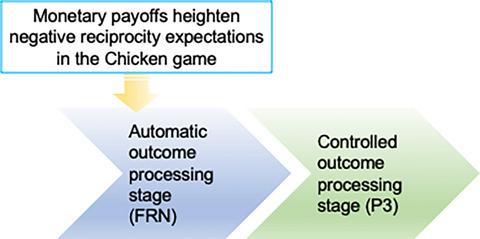当前位置:
X-MOL 学术
›
Eur. J. Neurosci.
›
论文详情
Our official English website, www.x-mol.net, welcomes your
feedback! (Note: you will need to create a separate account there.)
Monetary payoffs modulate reciprocity expectations in outcome evaluations: An event‐related potential study
European Journal of Neuroscience ( IF 2.7 ) Pub Date : 2020-12-30 , DOI: 10.1111/ejn.15100 Jin Li 1, 2 , Nian Xu 1 , Yiping Zhong 1, 2
European Journal of Neuroscience ( IF 2.7 ) Pub Date : 2020-12-30 , DOI: 10.1111/ejn.15100 Jin Li 1, 2 , Nian Xu 1 , Yiping Zhong 1, 2
Affiliation

|
Choosing cooperation or aggression relies on reciprocity preferences which refer to the tendency of an individual to return cooperative or aggressive action for cooperative or aggressive action (i.e., positive or negative reciprocity preference). The reciprocity preference is positively correlated with reciprocity expectation, wherein individuals with stronger reciprocity preferences may have higher expectations than future cooperative or aggressive behavior should be delivered by beneficiaries (positive reciprocity expectation) or victims (negative reciprocity expectation). Although previous studies have demonstrated that the presence of monetary payoffs enhances reciprocity preferences, the modulation of monetary payoffs in reciprocity expectations remains unclear. Using event‐related potentials (ERPs), we examined how monetary payoffs modulated reciprocity expectations by adopting the Chicken game. Participants were asked to choose between cooperation and aggression with a putative opponent in the Chicken game involving the monetary (vs. non‐monetary) payoffs. Participants’ electroencephalogram (EEG) was recorded when they saw the opponent's cooperative or aggressive decision. Results showed that compared to the non‐monetary payoff trials, the feedback‐related negativity (FRN) effect in response to the opponent's decisions was stronger following the participant's aggressive decision in the monetary payoff trials, whereas P3 was insensitive to monetary payoffs. These findings suggest that monetary payoffs heighten expectations of negative reciprocity at the earlier and automatic outcome processing stage.
中文翻译:

货币收益调节结果评估中的互惠期望:一项与事件相关的潜在研究
选择合作或侵略依赖于互惠偏好,互惠偏好是指个人为了合作或侵略行为而倾向于返回合作或侵略行为的倾向(即,积极或消极的互惠偏好)。互惠偏好与互惠期望呈正相关,其中互惠偏好较强的个人可能比受益者(正互惠期望)或受害者(负互惠期望)交付的未来合作或攻击行为具有更高的期望。尽管以前的研究表明,货币收益的存在增强了互惠偏好,但是对货币收益在互惠期望中的调节仍不清楚。利用事件相关电位(ERP),我们研究了货币收益如何通过采用Chicken博弈来调节互惠期望。在涉及金钱(相对于非金钱)收益的“小鸡”游戏中,要求参与者在与假定对手的合作和侵略之间进行选择。当参与者看到对方的合作或积极决定时,就会记录其脑电图(EEG)。结果表明,与非货币支付试验相比,参与者在货币支付试验中做出积极的决定后,对对手决定的反馈相关消极(FRN)效应更强,而P3对货币支付不敏感。这些发现表明,在较早的和自动的结果处理阶段,货币收益提高了对负互惠的期望。
更新日期:2021-02-15
中文翻译:

货币收益调节结果评估中的互惠期望:一项与事件相关的潜在研究
选择合作或侵略依赖于互惠偏好,互惠偏好是指个人为了合作或侵略行为而倾向于返回合作或侵略行为的倾向(即,积极或消极的互惠偏好)。互惠偏好与互惠期望呈正相关,其中互惠偏好较强的个人可能比受益者(正互惠期望)或受害者(负互惠期望)交付的未来合作或攻击行为具有更高的期望。尽管以前的研究表明,货币收益的存在增强了互惠偏好,但是对货币收益在互惠期望中的调节仍不清楚。利用事件相关电位(ERP),我们研究了货币收益如何通过采用Chicken博弈来调节互惠期望。在涉及金钱(相对于非金钱)收益的“小鸡”游戏中,要求参与者在与假定对手的合作和侵略之间进行选择。当参与者看到对方的合作或积极决定时,就会记录其脑电图(EEG)。结果表明,与非货币支付试验相比,参与者在货币支付试验中做出积极的决定后,对对手决定的反馈相关消极(FRN)效应更强,而P3对货币支付不敏感。这些发现表明,在较早的和自动的结果处理阶段,货币收益提高了对负互惠的期望。











































 京公网安备 11010802027423号
京公网安备 11010802027423号